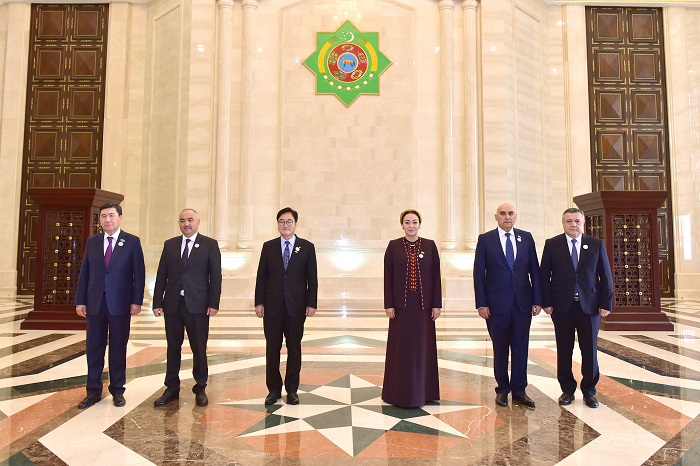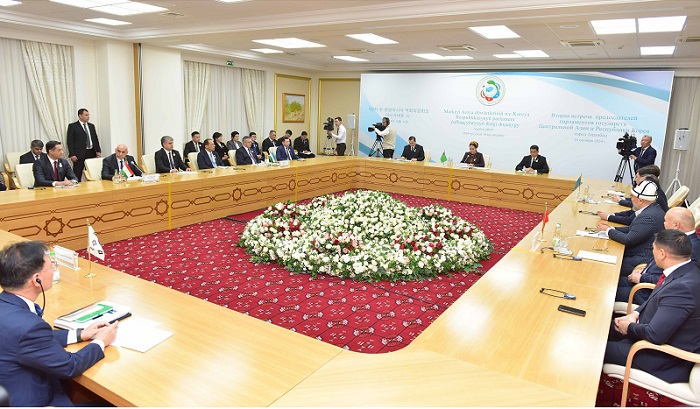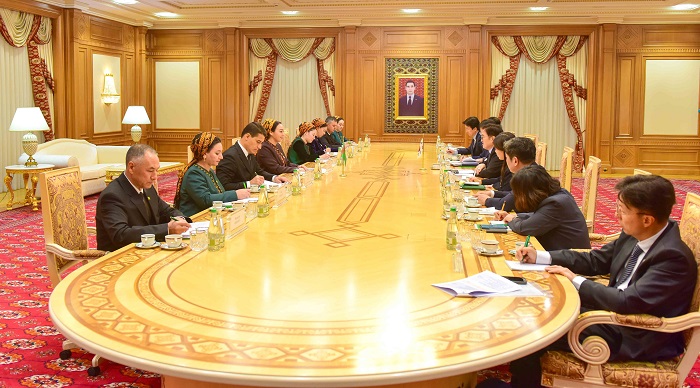On October 14, 2024, the second parliamentary meeting in the Central Asia-Korea format took place in Ashgabat.
The event was attended by:
- Woo Won Shik, Chairman of the National Assembly of the Republic of Korea
- Dunyagozel Gulmanova, Chairman of the Mejlis of Turkmenistan
- Nurlanbek Shakiev, Chairman of the Jogorku Kenesh of the Kyrgyz Republic
- Yerlan Koshanov, Speaker of the Majilis of Kazakhstan
- Mahmadtoir Zokirzoda, Chairman of the Majlisi Namoyandagon Majlisi Oli of the Republic of Tajikistan
- Nuriddin Ismoilov, Chairman of the Legislative Chamber of the Oliy Majlis of the Republic of Uzbekistan
- As well as parliamentarians from all participating countries.
During the plenary session, “Partnership for Peace, Prosperity, and Mutual Trust,” speakers emphasized the growing importance of interparliamentary dialogue in implementing high-level agreements and expanding practical cooperation between Central Asia and the Republic of Korea. They highlighted the role of Interparliamentary Friendship Groups in fostering mutual understanding and strengthening ties between the fraternal peoples of the region.
Turkmenistan’s foreign policy is determined by the philosophy of the National Leader of the Turkmen people, Chairman of the Khalk Maslahaty of Turkmenistan Gurbanguly Berdimuhamedov, expressed in the formula “Dialogue is a guarantee of peace.” Stressing that Turkmenistan attaches great importance to strengthening peace and trust, friendship and mutual understanding between peoples, Chairman of the Mejlis of Turkmenistan D.Gulmanova focused on the theme of the meeting – strengthening partnership for peace and sustainable development.
In a world undergoing rapid change, marked by climate challenges, demographic shifts, and rising tensions, constructive dialogue and mutual trust are essential for addressing global issues. As E. Koshanov (Kazakhstan) noted, these qualities are crucial for overcoming modern challenges and resolving problematic issues.
“Only through joint efforts, close cooperation, mutual trust and mutual understanding will we be able to give a positive impetus to the process of ensuring peace, stability and sustainable development,” M. Zokirzoda (Tajikistan) stressed.
“The economic well-being of the peoples of our countries directly depends on the quality of our interaction. Mutual trust is the foundation of any successful partnership. Through open dialogue and active interaction between parliaments, we can strengthen this trust. We must recognize that trust concerns not only the sphere of diplomacy and the economy, but is also a key element of the country’s domestic policy,” N. Shakiev (Kyrgyzstan) emphasized.
N.Ismoilov of Uzbekistan welcomed the UN General Assembly’s declaration of 2025 as the International Year of Peace and Trust, initiated by Turkmenistan.
Speaker Woo (Korea) commended Central Asia’s efforts in building smart new cities based on digital and eco-friendly infrastructure for sustainable growth, as well as its responses to the climate crisis. ‘Korea is also striving to overcome the climate crisis by maintaining the productivity of existing major industries such as automobiles, petrochemicals, and semiconductors while fostering information and communications, aerospace, and new industries, and expanding renewable energy research and low-carbon industries,’ he explained.
Concluding the main session, Woo emphasized the need for solidarity for peace, stating that ‘ultimately, everything is supported by stability and peace.’ He urged that “Korea and Central Asia, having been friends for over 1,500 years, should go beyond being mere friends and become trusted partners who prosper together in the rapidly changing new world order.”
***
In the afternoon, the work of the forum continued in two sessions: “Economic cooperation, digital economy and Industry” and “Cooperation between Central Asian countries and the Republic of Korea to mitigate the effects of climate change towards achieving Sustainable Development Goals”.
A recurring theme throughout the forum was the region’s strength, unity, and openness to cooperation.
Speaking about integration processes, the Chairman of the Parliament of Uzbekistan noted an increase in trade turnover by more than 2.5 times, an increase in the volume of mutual investments by almost 6 times, an influx of direct investment by 45 percent, and an almost twofold increase in intraregional tourism. There are many examples of cooperation in the field of business and humanitarian exchange. The Central Asian region is becoming one of the important centers not only of economic growth and investment activity, but also regains its historical role as a transport hub.
N.Ismoilov noted the region’s shared stance on global and regional issues and expressed a commitment to open dialogue and concrete results.
The Chairman of the Parliament of Kazakhstan recalled that at the Sixth Consultative Meeting of the Heads of Central Asian States held in Astana, the Concept of Development of regional cooperation “Central Asia – 2040” was adopted, which laid down the basic principles and key areas of multifaceted interaction in order to make Central Asia a region of peace, partnership and prosperity. The President of of Kazakhstan called the current stage of development and formation as a single region the “Renaissance of Central Asia,” E. Koshanov stressed.
Korea considers the countries of Central Asia as a single region in terms of developing cooperation. Highlighting the joint efforts of Kazakhstan, Kyrgyzstan, Tajikistan, Turkmenistan and Uzbekistan to realize the potential of socio-economic growth and national priorities, the Korean side noted industrial diversification, transport, development of economic and investment ties, digital technologies, innovations and artificial intelligence, training, the climate agenda and “green” energy among the relevant and promising areas.
During Special Session for Economic Cooperation, Digital Economy, and Industry, Chief Secretary of the National Assembly of the Republic of Korea Joe Oseop introduced the Korea-Uzbekistan Rare Metals Center, a joint research project on rare metals production technology, as a case study of Korea-Central Asia industrial cooperation. Chief Secretary Joe emphasized the need for mutual growth through complementary economic cooperation between Central Asia, which possesses abundant mineral resources and a young, large workforce, and Korea, a leading nation in information and communication technology.
The second meeting of the speakers of the parliaments of the Central Asian states and the Republic of Korea adopted a Joint Declaration.
* * *
Within the framework of the second meeting of the chairmen of the parliaments of the Central Asian states and the Republic of Korea, the second Turkmen-Korean consultative meeting was held with the participation of representatives of the Mejlis of Turkmenistan and the National Assembly of the Republic of Korea.
The meeting emphasized the importance of regular inter-parliamentary relations for strengthening bilateral ties, citing the participation of the Turkmen Mejlis Chairman in the previous Central Asia-Korea parliamentary meeting as an example.
The meeting discussed a range of topics, including trade, economics, culture, humanitarian cooperation, transport, energy, technology, science, education, healthcare, sports, tourism, climate change, and environmental protection.
The same day, Chairman of the Mejlis D.Gulmanova met with Chairman of the Mazhilis of the Parliament of the Republic of Kazakhstan E.Koshanov, Chairman of the Majlisi Namoyandagon Majlisi Oli of Tajikistan M. Zokirzoda, Speaker of the Legislative Chamber of the Oliy Majlis of the Republic of Uzbekistan N.Ismoilov, and bilateral meetings of interparliamentary friendship Groups were held. ///nCa, 15 October 2024


